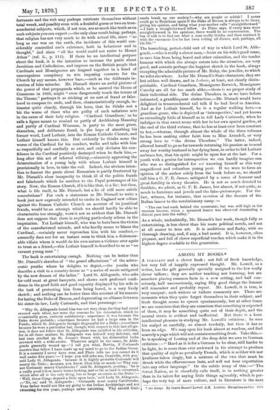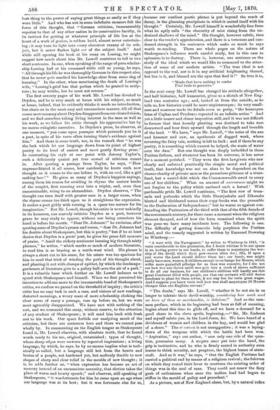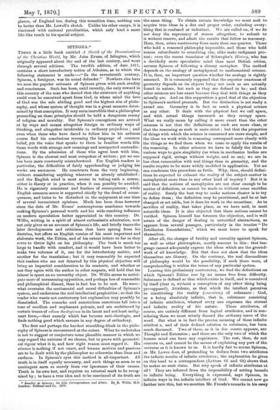AMONG MY BOOKS.*
A PLEASANT and a clever book ; not full of fresh knowledge, but very full of happily expressed thought. Mr. Lowell, as a writer, has the gift generally specially assigned to the few really clever talkers ; they are neither teaching nor learning, but are somehow placing common facts in a new setting, and half con- sciously, half unconsciously, saying fifty good things the listener will remember and probably repeat. Mr. Lowell, it is true, is very unequal ; such writers or talkers commonly are. There are momenta when they quite forget themselves in their subject, and fresh thought seems to sprout spontaneously, but at other times we are conscious that they are conscious that something is expected of them, it may be something quite out of their depth, and the mental strain is evident and ineffectual. But there is a keen intellectual pleasure in studying Mr. Lowell's criticism ; he uses his scalpel so carefully, so almost tenderly, but then it has so keen an edge. We may open his book almost at random, and find scarcely a page which will not contain something fresh. 'rake this,— he is speaking of Leasing and of the deep debt we owe to German criticism :—" Hard as it is for a German to be clear, still harder to be light, he is more than ever awkward in his attempt to produce that quality of style so peculiarly French, which is neither wit nor liveliness taken singly, but a mixture of the two that must be drunk while the effervescence lasts, and will not bear exportation into any other language." Or the subtle irony of this :—" The Great Nation, as it cheerfully calls itself, is in nothing greater than in its talent for saying little things agreeably, which is per- haps the very top of mere culture, and in literature is the next • ar Essays. By James Russell Lowell A.M. Loudon: Macmillan and Co. 1870.
beat thing to the power of saying great things as easily as if they were little." And who has not in some indefinite measure felt the force of this thought, that "German criticism, immeasurably superior to that of any other nation in its constructive faculty, in its instinct for getting at whatever principle of life lies at the heart of a work of genius, is seldom lucid, almost never entertain- ing; it may turn its light into every obscurest cranny of its sub- ject, but it never flashes light out of the subject itself." And while still opening his book at his essay on Leasing, we might suggest how much about him Mr. Lowell contrives to tell in two short sentences. In one, when speaking of the range of pure scholar- ship Leasing had at his command while still so young, he says, " All through his life he was thoroughly German in this respect also, that he never quite smelted his knowledge clear from some slag of learning." In the other, when mentioning the death of Lessing's wife, " Lessing's grief has that pathos which he praised in sculp- ture; he may writhe, but he must not scream."
The first seventy pages of his work Mr. Lowell has devoted to Dryden, and he is very much at home with his subject, so much at home, indeed, that he evidently thinks it needs no introduction, but chats on in the most easy and unconscious manner, till all that seems mere mummy about Dryden disappears from our cleared vision, and we find ourselves taking living interest in the man as well as his work, as we follow his critic through his appreciative but by no means eulogistic narrative. In Dryden's prose, he observes, at one moment, "you come upon passages which persuade you he is a poet, in spite of his verse often turning State's evidence against him." And there is some truth, too, in the remark that "he was the lock which let our language down from its point of highest poetry to its level of easiest and most gently flowing prose." In contrasting his style at one point with Jeremy Taylor's, such a deliciously quaint yet true morsel of criticism comes in. After quoting a passage from Taylor, he says, "How unpremeditated it all seems, how carelessly he knots each new thought as it comes to the one before it, with an and, like a girl making lace ! " He gives us many of Dryden's happiest sayings, among them his reason for avoiding in rhyme the narrow banks of the couplet, first running over into a triplet, and, even then uncontainable, rising to an alexandrine. Dryden observes, "The thought can turn itself with greater ease in a larger room, when the rhyme comes too thick upon us it straightens the expression. It makes a poet giddy with turning in a space too narrow for his imagination." But Mr. Lowell, though his satire is never unkindly in its keenness, can scarcely Criticize Dryden as a poet, however grave he may study to appear, without our being conscious his hand is before his mouth. "Dear Dr. Johnson!" he exclaims, after quoting some of Dryden's proses and verses, "dear Dr. Johnson had his doubts about Shakespeare, but this is poetry," but if he at least denies that Dryden is a poets' poet, he gives his prose full measure of praise. "Amid the rickety sentiment looming big through misty phrases," he writes, "which marks so much of modern literature, to read him is as bracing as a north-west wind. His phrase is always a short cut to his sense, for his estate was too spacious for him to need that trick of winding the path of his thought about, and planting it out with clumps of epithet, by which the landscape- gardeners of literature give to a paltry half-acre the air of a park." It is a valuable hour which further on Mr. Lowell induces us to spend with Shakespeare and himself. When we first perceived his intention to add one more to the innumerable band of Shakespeare's critics, we confess we paused on the threshold of inquiry; the critic's critic has no easy task in such a case, and visions of new readings, distorted meanings, a weary maze of mere scholarship choking the clear sense of many a passage, rose up before us, but we were most agreeably disappointed. We have met with nothing of the sort, and we commend this essay, without reserve, to the attention of any student of Shakespeare ; it will send him back with fresh zest to his work. Our space forbids our analyzing much of the criticism, but there are sentences here and there we cannot pass wholly by. In commenting on the English tongue as Shakespeare found it, Mr. Lowell observes, with absolute truth, that he found words ready to his use, original, untarnished ; types of thought, whose sharp edges were unworn by repeated impressions ; a living language, by which, he says, he by no means implies what is tech- nically so called, but a language still hot from the hearts and brains of a people, not hardened yet, but moltenly ductile to new shapes of sharp and clear relief in the moulds of new thought; it is, he adds further on, "when expression has become an act of memory instead of an unconscious necessity, that diction takes the place of warm and hearty speech ;" and observes, still speaking of Shakespeare, "it was fortunate for him he came upon an age when our language was at its best ; but it was fortunate also for us, because our costliest poetic phrase is pat beyond the reach of decay, in the gleaming precipitate in which it united itself with his thought." Certainly, Mr. Lowell himself is wonderfully free from what he aptly calls "the obscurity of mist rising from the un- drained shallows of the mind." His thought, however subtle, rises clear to the reader's apprehension, and there is a terseness and con- densed strength in his sentences which make so much he says worth re-reading. There are whole pages on the nature of Shakespeare's influence worth careful study, but in this case to epitomize is to destroy. There is, however, one sentence on the study of the ideal which we would like to commend to the atten- tion of some of our modern artists. "The true ideal is not opposed to the real, nor is it in any artificial heightening thereof, but lies in it, and blessed are the eyes that find it !" So true it is,
"Minds that have nothing to confer Find little to perceive."
In the next essay Mr. Lowell has changed his attitude altogether, and half historian, half humourist, gives us a sketch of New Eng- land two centuries ago; and, looked at from the outside, as he tells us, few histories could be more unpicturesque; its very small- ness and nearness made its details seem so petty, "the homespun fates of Cephas and Prudence repeated in an infinite series." And yet a little nearer and closer inspection still, and it was not difficult to foresee that that homely planting was destined to take root downward and bear fruit upward through the length and breadth of the land. " We have," says Mr. Lowell, "the noise of the axe and hammer and saw, an apotheosis of dogged work, where reversing the fairy tale, nothing is left to luck ; and if there be any poetry, it is something which cannot be helped, the waste of water over the dam." But one thought was deeply imbedded in those Puritan fathers, and whatever has been its outcome, it has never for a moment perished. "They were the first lawgivers who saw clearly and enforced practically the simple moral and political truth, that knowledge was not an alms to be dependent on the chance charity of private men or the precarious pittance of a trust- fund, but a sacred debt which the Commonwealth owed to every one of her children." What an amount of narrowness might we not forgive to the policy which enclosed such a kernel ! With pardonable pride Mr. Lowell continues, "The first row of tram- mels and pothooks which the little Shearjashubs and Elkanahs blotted and blubbered across their copy-books was the preamble to the Declaration of Independence;" but he warns us against con- founding the Puritanism of the third with that of the fifth decade of the seventeenth century, for there came a moment when the religious element decayed, and of how the form remained when the spirit was gone we have many incidents here. The following is one. The difficulty of getting domestic help perplexes the Puritan mind, and the remedy suggested is written by Emanuel Downing to Winthrop :—
" A warr with the Narraganset," he writes to Winthrop in 1645, 'is verie considerable to this plantation, ffor I doubt whither it be not synne in us, having power in our hands, to suffer them to maynteyne the wor- ship of the devill, which their paw-wawes often doe ; 2lie, If upon a just warre the Lord should deliver them jut) our hands, woe might easily have men, women. & children enough to exchange for Moores, which wilbe more gaynefull pilladge for us than wee conceive, for I doe not see how wee can thrive untill wee gett into a stock of slaves sufficient to do all our business, for our children's children will hardly see this great Continent filled with people, soe that our servants will still desire freedoms to plant for them selves, & not stay but for verie great wages. And I suppose you know verie well how wee shall maynteyne 20 Moores cheaper than one Englishe servant."
"The doubt," says Mr. Lovell, "whether it be not sin in us longer to tolerate their devil-worship, considering how much need we have of them as merchandise, is delicious!" And so the com-
mon preface, which in its beginning had been so full of meaning, begins about this time to glide off, and we have a demand for a good share in the slave spoils, beginning,—" Sir, Mr. Endecot and myself salute you, in the Lord Jesus, Rte. We have heard of a dividence of women and children in the bay, and would bee glad of a share." The et ctetera is not unsuggestive ; it was a laying- down of the weapons with which the battle had been won. "Aspiration," says our author, "sees only one side of the ques- tion, possession many. A sceptre once put into the hand, the grip is instinctive, and he who is firmly seated in authority soon learns to think security, not progress, the highest lesson of state- craft. And so it was," he says, " that the English Puritans had carried a political end by means of a religious revival; the fulcrum on which they rested their lever to overturn the existing order of things was in the soul of man. They could not renew the fiery gush of enthusiasm when once the molten lead had begun to stiffen in the mould of policy and precedent."
As a picture, not of New England alone, but, by a natural idles glance; of England too, during this transition time, nothing can be better than Mr. Lowell's sketch. Unlike his other essays, it is tinctured with national peculiarities, which only lend a more life-like touch to his special subject.
































 Previous page
Previous page